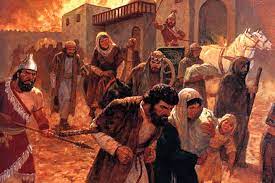The Eyes of the Arrogant Will Be Humbled
2: 9-11
The eyes of the arrogant will be humbled DIG: 1:10-21 is a song of judgment against the people described in 1:6-8. What is the root cause of their sin? How will they be humbled?
REFLECT: The proud, arrogant people are condemned in powerful images relevant to Isaiah’s day. If Isaiah wrote this prophecy today, what symbols would he use? Isaiah anticipated that God’s judgment would come via Assyria, and later, Babylon. In Revelation 6:15-16, John alludes to Isaiah’s imagery as an apt description of the coming worldwide judgment of God. What do you need to change, so that you will not be one who is trying to hide in the ground from God in that day? How can you help others from this fate?
Judgment will be announced because of the sins of Isra’el. Isaiah says that the people will be humbled. This Hebrew verb is in the perfect tense. The prophet is so sure of the result, that he describes it as an event that had already taken place. The verb is singular, emphasizing the effect on each individual. So people will be brought low and everyone humbled (2:9a). Because they bow down to idols, they will be made to bow down to the mighty hand of ADONAI. The punishment for playing god can be no less than banishment from YHVH. This is a denial of God’s basic purpose for us – fellowship with Him.

Another result of this judgment will be that Isra’el and Judah were not to be forgiven (2:9b). The Hebrew imperative expresses an inevitable outcome. There was no way they could be forgiven – judgment would assuredly come. In these dual near historical future prophecies, the northern kingdom of Isra’el would eventually be forced to suffer the consequences of the Assyrian invasion, occupation and assimilation, while the southern kingdom of Judah would ultimately be forced to endure the Babylonian captivity for seventy years (see my commentary on Jeremiah, to see link click Gu – Seventy Years of Imperial Babylonian Rule).
But there is another aspect to this judgment. In the far eschatological future, this judgment will be so severe that people will hide from the glory of ADONAI. Isaiah prophesies and says to them: Go into the rocks, hide in the ground from the dread of ADONAI, and the splendor of His majesty (2:10)! The day of the LORD was a well-known theme in the prophets (Amos 5:18-20; Joel 1:15, 2:1, 11 and 31; Zephaniah 1:7 and 14; Zechariah 14:1; Malachi 4:5). The Jewish religious leaders at the time of Isaiah taught that it would be a time when God would bless His people. But the prophets’ said that it would be a time of devastation and terror. Only afterward, blessing would come (Isaiah 11:10, 12:1; Amos 8:11; Zechariah 14:1; Malachi 4:5).
As a result, they will not be able to escape His fierce wrath (see the commentary on Revelation Cq – The Sixth Seal: The Sun Turned Black). The eyes of the arrogant will be humbled and human pride brought low. ADONAI alone will be exalted in that day (2:11). With the destruction of their pride, God alone will be exalted. The term, that day, gives us a hint. What kind of a day will it be? Isaiah tells us next.



Leave A Comment